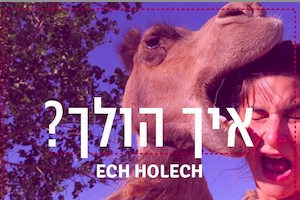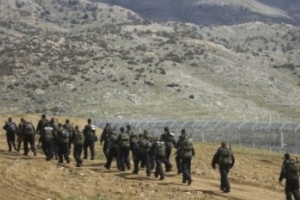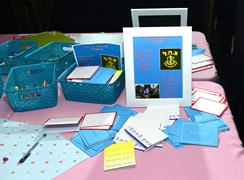Never Knocking The "Nice" Out of Myself
By Rabbi Dan Ornstein
Whenever I board a flight to Israel, I find myself quickly switching into “nice” mode. I would like to believe that I am generally a kind person. However, a long flight overseas to Israel seems to force an added drop of human decency out of me. There is nothing especially humanizing about sauntering back into economy class in preparation for no leg room, little sleep, and close quarters with members of the tribe, specifically those who I am not sure I like, mostly because I have defensively decided ahead of time that they do not like me.
Bracing myself for a social science experiment in the effects of overcrowding, I dredge up my fiercest teeth-gritting resolve not to turn snarky, pushy or rude. This usually makes me feel very righteous, as I figure out a way to retain my humanity in a metal tube speeding at seven hundred miles an hour, at thirty five thousand feet in the air.
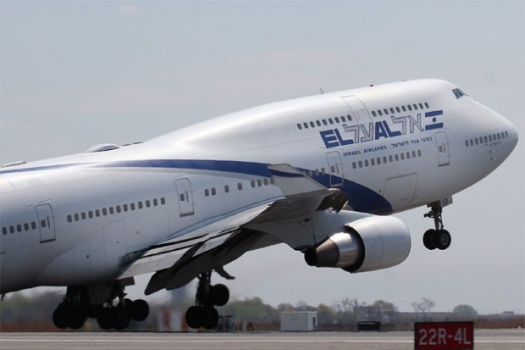
How nice it would be if others recognized my efforts. This past Wednesday afternoon, I arrived at seat 48G on my EL AL flight to Tel Aviv, yet someone else had also been assigned the seat which was next to some members of my synagogue. The passenger already there was also in “nice” mode, and she generously offered to get up and move. “Don’t worry about it,” I assured her, “I’ll be together with them in Israel for the next two weeks. You stay where you are.”
I was feeling pretty “nice” right then, a living embodiment of God’s commandment to love one’s neighbor as oneself. I spoke with the attendant, and she moved me to 51D, a relatively comfortable aisle seat. 51D, it turns out, was where one of my other congregants was sitting. However, the attendant then moved him to an aisle seat near me, and moved another man from that seat into a seat mid-row. This gentleman began to complain that he really would prefer an aisle seat, if possible. I graciously offered to have him switch seats with me, my “nice” now dripping out of me like honey.
The young attendant, half both our respective ages and in no mood to deal with complainers or overly solicitious do-gooders, patiently instructed him to take the seat to which he was now assigned. She mumbled something about him, then scolded me in Hebrew, “Attah yoteir mi dai tov. B’Yisrael yidrechu alekha.” “You’re too nice. In Israel they would step all over you.”
I sheepishly muttered to her in English, “Yeah, yeah, I know.” I sat down, a naive American chastened and re-taught a valuable lesson about the harsh “law of the streets” of Israeli life and attitude. My “nice” was knocked off its perch and I felt like a “fri’er,” the popular Hebrew term for sucker.

Yiddish for an upright, outstanding person.
Copyright © Melanie Rubin
Some Israelis have told me repeatedly that Israeli society is full of people who so nervously anticipate being played for fools that they are constantly on guard and on the make. Interesting explanations for this “fri’er fear” abound, ranging from Israelis’ sorry experiences with repeatedly failed peace negotiations to their deep disappointments with the national government. Being nice does not seem to hold much weight with the cynics who tell me these things. Though I could benefit from being a bit less gracious toward those who are less than deserving, I am not switching off my “nice” anytime soon. An encounter I had long ago here in Jerusalem is one reason why.
On a visit in 1998, my pregnant wife, two little children and I one day took what was then the Number 99 bus that circled the city, allowing us to get on and off at different stops for one set price. Though I speak fluent Hebrew, my math skills are wanting, and I was still quite jet lagged and distracted by my family’s needs.
Misunderstanding the driver, I overpaid him. Because he needed to account for all the fares he collected, he said he was unable to repay me on the spot. “Lo norah,” “It’s not so terrible,” I told him, “Why don’t you just keep the extra money.” My accounting error left me quite a few shekels short, but I was determined to let my “nice” rule the day, because I felt so stupid. “No, give me your number at your hotel and I will repay you before you leave,” he replied. “Yeah, right,” I thought to myself, “Even a sucker like me knows that I’ll never see that money again.” However, he insisted, so I gave him my name, and the name and number of the hotel. As we got off the bus at the biblical zoo, he shouted to me, “My name is Yaakov. I’ll call you.”
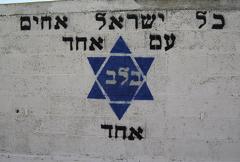
Translation: All of Israel are brothers; one nation with one heart.
That night, Yaakov called me. Over the next two weeks, Yaakov wouldn’t stop calling me, and the messages he left for me at the front desk in that pre-cell phone era began to pile up. When we finally connected and arranged a time to meet, I asked Yaakov incredulously, “Why did you keep calling me? I already told you to take the money, as I never expected to see it again.” He paused then said, “You don’t understand. My family and I are religious people. The money is yours. We had no choice but to return it.” Return it he did.
Just as throughout the world, there are people, even in this holiest city, who would slit someone’s throat for a shekel. There are also people like Yaakov, who reminded me many years ago that being “nice” is not the domain of suckers but a fine expression of what Abraham Lincoln called the angels of our better natures.
Reprinted from The Times of Israel with the author's permission.


